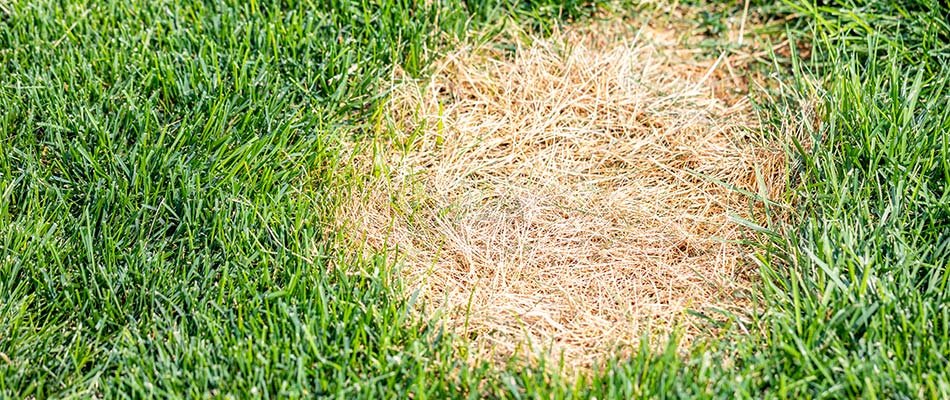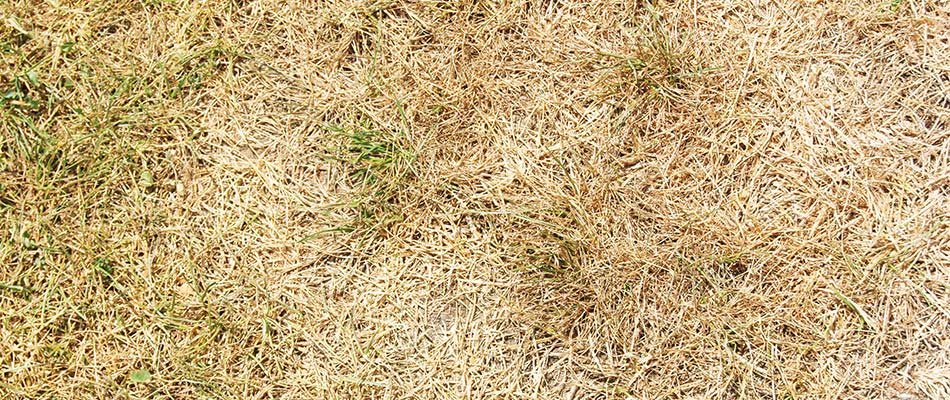Discovering that you have brown patches of grass is never on a property owner's list of favorite things. How did this happen? Your lawn will tell you when it is in distress. A brown lawn means that something needs to change within your lawn maintenance and care schedule. We are here to help you discover the root of the problem and learn exactly what services will help eradicate it.
When property owners see brown patches of grass, many assume it is because of a lack of water. This could very well be true and your watering schedule should be the first thing you take a second glance at to ensure you are hydrating your lawn enough. However, if the problem persists even after you know you are watering enough, there could be a deeper issue. Brown grass is a symptom of a lot of lawn diseases and insect infestations like grubs. Continue reading to learn more about these causes and how to eradicate them.
Are you underwatering your lawn?
Although there are many different reasons why your lawn could have brown patches, it's likely that it is just simply lacking water. Much like humans, your turf needs the right amount of water to thrive. The solution to an underwatered lawn is to get on a correct watering schedule. As a general rule, your lawn needs 1 - 1.5 inches of water each week from either rain, an irrigation system, or manual watering. Be careful not to overwater your lawn, either, because that will cause other issues that we're sure you don't want to deal with!
To ensure that enough water penetrates your soil and reaches your roots, it is best to water your lawn infrequently with longer sessions, as opposed to frequent, shorter sessions.
Your brown grass might be the result of lawn insects like grubs.

Certain lawn insects are damaging to your turf. They can turn a vibrant, green lawn into a waste of brown grass in what seems like just one day. Once these insects find their way to your lawn, they will eat away at your roots or suck moisture from your grass blades, both of which result in brown, dead grass.
Some common lawn insects that we often see in the Elkhart area include:
- Grubs
- Armyworms
- Mole crickets
- Chinch bugs
- Sod webworms
Once these insects begin eating away at your grass, there are curative solutions that can help stop the problem. However, the best way to avoid the problem in the first place is to schedule preventative treatments and keep up with a consistent lawn care and maintenance schedule including fertilization, weed control, annual aeration, and overseeding. These services will help your lawn stay healthy and fight off insects naturally.
Lawn disease could be the culprit of your brown grass.

Common lawn diseases that we see here in the Elkhart, IN area include dollar spot and red thread.
- Dollar spot is a type of fungus that causes small, circular brown patches throughout your lawn. They are usually distinct patches about the size of a silver dollar, hence the name, "dollar spot."
- Red thread causes your grass blades to appear raggedy and dead. Red, thread-like streaks begin to appear throughout your lawn.
Once you spot these problems, you can opt for temporary lawn disease treatments which will stop the disease in its tracks. However, just like with lawn insects, the only way to get to the root of the issue and prevent the problem from returning is to adopt the correct lawn care and maintenance schedule.
Does your lawn need to be rescued from patchy, brown grass? Call us today!
At Grow Pros Lawn Care, LLC, we pride ourselves on offering exceptional lawn care and maintenance services in Elkhart, Granger, South Bend, and nearby communities in Indiana. We have been working in this area since 2012 and our experts are familiar with the common problems that we see in our area like lawn diseases and insect infestations. We can help you identify the culprit of your brown grass and curate a plan to get your lawn back to looking its best. Call us today at (574) 326-3526 to schedule a consultation with one of our experts.



Comments (0)
Thanks for your comment!
Thanks for your feedback! Your comments have been successfully submitted! Please note, all comments require admin approval prior to display.
Error submitting comment!
There is a problem with your comment, please see below and try again.